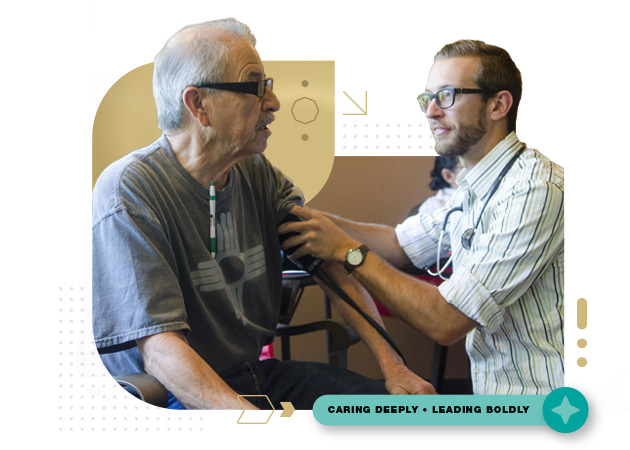Doctor of Nursing Practice
Public Health Nursing
Advance community health with a Doctor of Nursing Practice in Public Health Nursing. In this program, you’ll learn to become a nurse leader who works to prevent disease and promote health for entire populations. You'll gain the science and leadership skills you need to advance public health. If you have a bachelor's in nursing and a master’s in public health, this program is the right fit for you.

Overview
Format
Hybrid online
Mostly online with some in-person requirements on the CU Anschutz Campus in Aurora, CO.
Avg. time to complete
2 years
6 semesters
Clinical placements set up for you
If you’re in Denver or Aurora, we arrange clinical placements for you. We work with some of the top clinics and hospitals in the metro area to provide high-quality, hands-on experiences.
Expert faculty dedicated to your success
Many of our faculty are recognized locally and nationally for their excellence in nursing, education, and research. Our educators are passionate about helping students advance their knowledge and careers.
#1
Doctor of Nursing Practice program in Colorado*
Career
This program
prepares you for leadership roles where you'll improve community health and well-being.
Example job titles
- Public health nurse practitioner
- Community health program manager
- Director of public health nursing
What you can do
- Educate patients about health management and disease prevention
- Implement public health awareness campaigns to keep the community healthy
- Provide expertise to healthcare organizations or government agencies
Where you can work
- Schools
- Healthcare systems
- Government agencies
- + more
What's the difference between a DNP and PhD degree?
The main difference between a Doctor of Nursing Practice (DNP) and a Doctor of Philosophy (PhD) degree is their focus. The DNP program focuses on applying the latest evidence in clinical practice. The PhD program emphasizes scientific research and pairs you with a faculty member who shares your interests. Both degrees offer various career paths in clinical or academic settings and teach strategic leadership skills.
Not sure which is right for you? Contact the assistant dean of the PhD program or the assistant dean of the DNP program to discuss your options.
Admissions
Deadline(s)
| Start term | Application opens | Priority deadlinetooltip | Extended deadlinetooltip |
| Spring 2026 | January 15, 2025 | July 1, 2025 | Not applicable |
| Fall 2026 | August 15, 2025 | January 15, 2026 | May 1, 2026 |
Get started
1
Check the requirements
Understand the admissions requirements like how many letters of recommendation you need and what courses should be on your transcript.
2
Start your application
Work on your application and submit it through NursingCAS.
Curriculum
Real-world experience
You’ll gain up to 630 hours of clinical training in this program. We set up placements for you if you’re in the Denver Metro area, where you’ll use your public health and nursing skills to help patients.
Advanced classes
In 20-21 credit hours, you’ll complete courses including innovative leadership and evaluating evidence in evidence-based practice.
Skills and knowledge you'll gain
Costs
| Residency status | Estimated total tuition** |
| Colorado residents | $51,025 |
| Eligible western state residents** | $51,025 |
| Nonresidents | $82,745 |
| Additional expenses | Time frame | Estimated costs |
| Matriculation fee | One-time | $140 |
| Other fees | By term | Fall $392, Spring $232, Summer $180 |
| Books and supplies | Total for program | $2,000 |
| CU health insurance (may be waived with proof of comparable personal health insurance) | By term | Fall $1,575, Spring $1,575, Summer $1,050 |


Public health nurses think about the health and wellness of the population as well as system-level interventions so people can attain the best health they can... I love helping remove barriers to health at the population level, and I feel so strongly and passionately about everyone’s right to receive healthcare.
Becca Miles, BSN, RN
CU Nursing Alum
DNP/MPH dual degree program
Become the public health leader looked to first 
Get your degree from the top nursing college in Colorado. Start your journey to today.